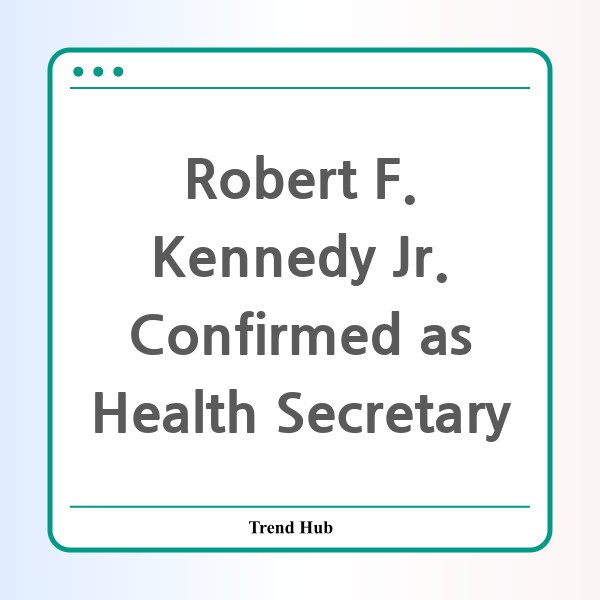* This website participates in the Amazon Affiliate Program and earns from qualifying purchases.

The recent confirmation of Robert F. Kennedy Jr. as the Secretary of Health and Human Services has sparked significant discussion across the political spectrum. With a narrow vote of 52-48 in the Senate, Kennedy's appointment marks a pivotal moment in public health leadership in the United States.
Kennedy, a member of the famous Kennedy family and a long-time public figure, is renowned for his controversial views on vaccines. His skepticism about vaccine safety has not only drawn criticism but also raised critical questions about his suitability to oversee the nation’s health policies. His responsibilities extend to overseeing agencies that manage Medicare and Medicaid, combating infectious diseases, conducting medical research, and regulating food and medicine.
The Senate confirmation process revealed deep divisions among lawmakers, primarily along party lines. Notably, Senator Mitch McConnell expressed his strong opposition to Kennedy, citing a "record of trafficking in dangerous conspiracy theories" that undermine public confidence in health institutions. McConnell, who is a polio survivor, emphasized the need for a leader who could restore trust in the health sector rather than diminish it further.
Despite these concerns, Kennedy managed to gain support from key Republican senators, including Lisa Murkowski and Susan Collins, who expressed their belief in his commitments to adhere to scientifically backed health policies and ensure that the CDC's advisory committee on immunization practices is maintained and supported. This bipartisan support highlights a complex dynamic, where some lawmakers prioritize Kennedy’s potential to address food safety and public health topics over his controversial past.
As Kennedy steps into his role as health secretary, his leadership will influence significant health care initiatives, including pandemic preparedness and vaccine development. His past campaigns—originally as a Democrat and later endorsing President Trump as an independent candidate—indicate a willingness to navigate various political landscapes, further complicating the expectations surrounding his role.
The implications of Kennedy's confirmation are far-reaching. Public health advocates express concern about the potential for his past activism against vaccines to shape health policy in ways that could undermine established scientific consensus. Critics stress that sowing doubt about vaccines and public health practices can create barriers to progress in combating diseases and ensuring public health safety.
Going forward, it will be crucial to monitor how Kennedy addresses these challenges. His administration's approach to vaccine safety, health education, and public outreach will likely impact trust in health institutions and the overall effectiveness of health policies in America. The upcoming months will reveal whether Kennedy can balance his controversial views with the responsibilities of his new office, ultimately determining his legacy as Secretary of Health and Human Services.
* This website participates in the Amazon Affiliate Program and earns from qualifying purchases.